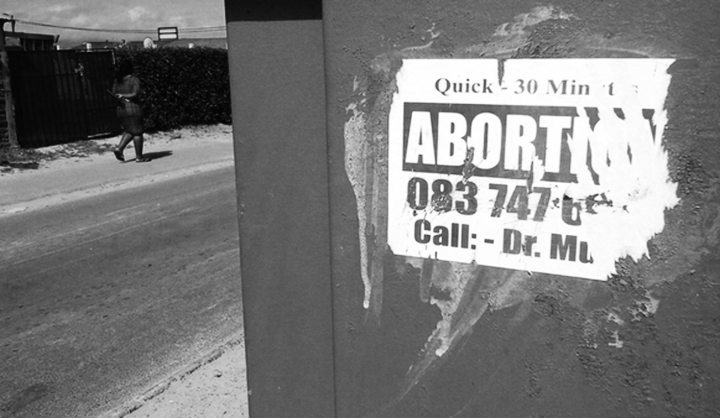South Africa
GroundUp: Abortion stigma harms thousands of young women

Many South African women are still resorting to unsafe abortions with illegal providers, often with disastrous implications even though safe, legal abortions haves been available since 1997. By THEMBELA NTONGANA for GROUNDUP.
A 28-year-old mother of two who had a backstreet abortion four years ago when she was four months pregnant says: “I was working a contract job and the father of my first born was in jail. I didn’t trust the man who made me pregnant to support the child and I couldn’t support two kids [then].
“I saw an advert in a newspaper for ‘safe abortion’ and I called the number. The guy told me to meet him in town … He gave me two pills and I paid him R150. But the pills didn’t work. So I called him again and told him that they didn’t work; isn’t there something else he could do? He said there is, but I must pay him again and I did.”
She said she was taken to a dark room with black curtains in a vacant building where she was told to lie down and “pills were inserted” into her “womanhood”.
“As I was on my way home, I could feel my body feeling weak; no pain, just weak, and after a few hours of being home, the baby came out, and I was shocked, because I didn’t expect a full baby.
“After that I started bleeding heavily and I didn’t know what to do. When I tried calling him, his phone was off. After a couple of days, I went to the clinic and I lied and told them that I was working in construction and had a miscarriage and they gave me pills to clean myself.
“That was when I decided that I will never do it again because a person could die without feeling any pain as the body slowly gets weaker and weaker.
“I didn’t go to the clinic because I knew they wouldn’t do it … I was four months and they would advise me to keep the baby and to give it to them … I couldn’t live with myself knowing I have a child somewhere,” she said.
Abortion is available in South Africa within the first 12 weeks of pregnancy upon request. From week 13 to 20, it can be carried out if a medical practitioner finds that the woman’s physical or mental health is at risk, there is a high risk that the foetus has a severe abnormality, the pregnancy resulted from rape or incest, or if the pregnancy compromises the woman’s social or economic situation. After week 20, abortion is available if the life of the woman or health of the foetus is at risk.
Marie Stopes South Africa provided 35,000 safe abortions in 2014. The most recent figures from the Department of Health indicate that approximately 89,126 abortions were provided in the public sector in the 2014/15 year.
The Guttmacher Institute estimates that Southern Africa has the lowest abortion rate of all African subregions, at 15 per 1,000 women in 2008; East Africa has the highest rate, at 38. In South Africa, the annual number of abortion-related deaths fell by 91% after the liberalisation of the abortion law. In 2008, more than 97% of abortions in Africa were unsafe. Southern Africa is the subregion with the lowest proportion of unsafe abortions, but it is still estimated that 58% are unsafe.
Director of the Women’s Health Research Unit at the University of Cape Town, Professor Jane Harries says many women do not feel comfortable accessing public sector facilities due to stigma and the attitudes of healthcare providers.
“We found that women are accessing illegal or backstreet abortions in various ways – some buy herbal and other products from shops and chemists or visit a traditional healer whereas others go onto the internet and seek the services from illegal unregistered abortion providers,” says Harries.
Advocacy and engagement manager at Marie Stopes South Africa Andrea Thompson says unsafe abortion is a serious problem in South Africa, largely due to the unfair stigma that is still placed on what is a vital health service that women should be able to access safely in legitimate facilities.
“Young women are particularly at risk as they are often discriminated against when attempting to access safe sexual and reproductive health services or feel forced to choose a clandestine option to avoid being stigmatised,” says Thompson.
She adds that illegal providers provide various kinds of tablets, which they market as medical abortion services.
“Most do not bother to provide pre-care and aftercare information. Some do not have the medical expertise to provide a proper examination to assess the gestational age of the pregnancy.
“In many cases those claiming to provide medical abortions are not even using the appropriate dosages or even the right medications – which is clinically unsound. They often offer to meet women on street corners, in parking lots or even make deliveries to homes and workplaces – all of which is illegal under the Act.
“It’s vital that women know that they have the right to a legal abortion in this country up to 20 weeks of pregnancy. Unsafe providers profit from the fact that women are often unaware of their rights under the law,” says Thompson.
Immediate complications from unsafe abortions include severe bleeding, uterine perforation, tearing of the cervix, severe damage to the genitals and abdomen, internal infection of the abdomen and blood poisoning.
Medium-term complications range from reproductive tract infections and pelvic inflammatory disease to chronic pain. Late complications include increased risk of infertility and ectopic pregnancy, miscarriage or premature delivery in subsequent pregnancies. DM
Photo: An abortion services poster on an electric box in Mfuleni. Photo by Masixole Feni.


















 Become an Insider
Become an Insider